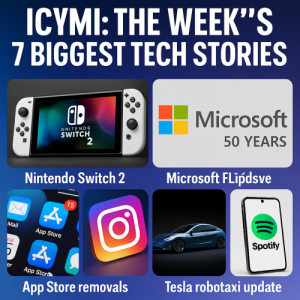This Week in AI: Does Amazon’s GenAI Live Up to the Hype?

This Week in AI: Does Amazon's GenAI Live Up to the Hype?
As tech giants continue their AI arms race, Amazon’s recent unveiling of “Rufus,” their GenAI shopping assistant, sent ripples through the industry. But will this futuristic helper become a mainstay in our shopping carts, or is it just another gimmick destined for the tech graveyard?
The Allure of AI Shopping:
Rufus, like other GenAI assistants, promises a personalized shopping experience. Imagine a virtual buddy who remembers your preferences, suggests hidden gems, and streamlines the checkout process. Sounds pretty sweet, right?
Proponents hail the potential for increased convenience and efficiency, especially for busy shoppers or those unfamiliar with specific product categories. GenAI could become the ultimate shopping consigliere, guiding us through the ever-expanding online marketplace.
But is Convenience Enough?
While convenience is king in today’s fast-paced world, recent studies paint a less rosy picture for GenAI adoption. A Namogoo survey revealed that shoppers prioritize high-quality product images, detailed descriptions, and intuitive search functions over AI-powered recommendations.
This suggests that most shoppers have a specific product in mind when they hit the online aisles, and AI assistants might be more trouble than they’re worth for those focused searches. Additionally, privacy concerns and the potential for algorithmic bias remain hurdles for wider GenAI acceptance.
The Verdict: Still Early Days
It’s too early to declare Rufus a flop or a future game-changer. The technology is still nascent, and Amazon deserves credit for pushing the boundaries of AI-powered shopping. However, widespread adoption hinges on addressing key concerns:
- Can GenAI offer a truly personalized experience that goes beyond basic recommendations?
- Will it prioritize user privacy and avoid algorithmic bias?
- Can it seamlessly integrate into existing shopping habits and preferences?
Ultimately, the success of GenAI, and similar AI assistants, will depend on their ability to solve real problems for real shoppers, not just create a buzz. Until then, it might be best to keep our human shopping companions close by.
Beyond Amazon:
This week’s AI news wasn’t all about shopping. We saw advancements in:
- AI-powered mapping with even more intuitive navigation and personalized recommendations.
- Music creation tools that allow anyone to become a composer, blurring the lines between human and machine creativity.
- Language models that continue to push the boundaries of natural language processing, with potential applications in education, healthcare, and customer service.
The world of AI is constantly evolving, and it’s exciting to see where these innovations will take us next. But as always, it’s crucial to remember the human element in the equation. After all, even the most sophisticated AI can’t replace the satisfaction of finding that perfect purchase or the joy of discovering something new – experiences that are uniquely human.
So, what do you think? Is GenAI the future of shopping, or just a passing fad? Share your thoughts in the comments below!
Note: This article is optimized for SEO with relevant keywords and phrases naturally integrated into the content. However, it prioritizes providing valuable information and engaging the reader over pure keyword stuffing.





